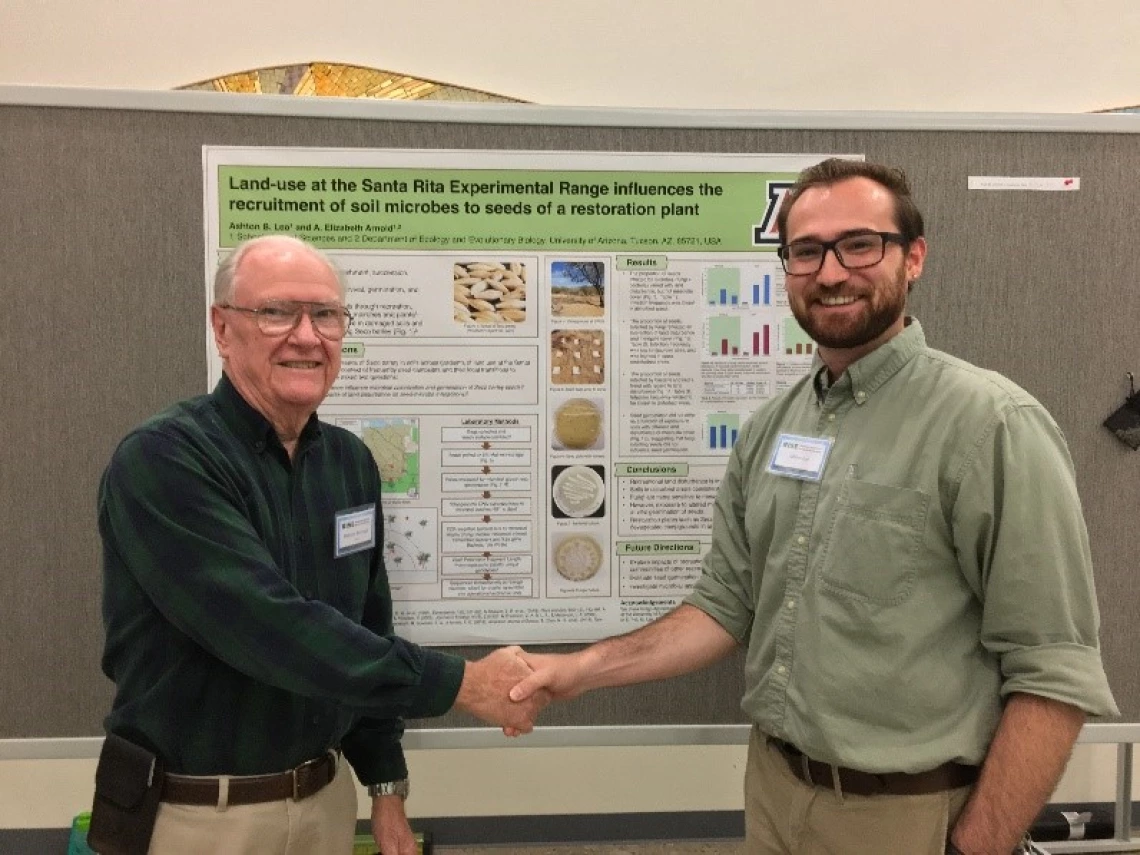15th Annual RISE Symposium includes Student Poster Contest Winners

On Saturday 20 October 2018, 73 people attended the 15th Annual RISE (Research Insights in Semi-Arid Environments) Symposium in the Marley Building on the University of Arizona campus. You can find the program at http://www.tucson.ars.ag.gov/rise/index.htm
The objectives of the symposium are to share recent results of scientific research in semiarid environments, with an emphasis on work conducted at the USDA-ARS Walnut Gulch Experimental Watershed (WGEW) and the University of Arizona Santa Rita Experimental Range (SRER), and to encourage future research and outreach activities.
This year, 13 speakers covered a wide variety of topics, and some included results of work completed and on-going at WGEW or SRER. Access to publically-available data, increase in wireless data access at the SRER, CyVerse supported data processing capacity, handling and interpreting big data from remote sensing campaigns, spatial and temporal patterns of precipitation intensity, and expression of deep geologic time in soil and landscape development were covered in the morning session. The afternoon session had more focus on organism behavior and ecology, including soil microbial abundance in relation to soil and soil-water qualities, behavior of aquatic invertebrates as a driving mechanism in the abundance and distribution in southwestern streams, tools and data sets to study phenology patterns, and long-term studies of human and desert plant dynamics on Tumamoc Hill operated by the UA Desert Lab. During their presentations, several speakers solicited collaborators for future work and with publically-acessible data, and most prominent in that behavior was Dr. Heather Throop who is 5 years into a 30 NSF-funded project that manipulates leaf litter inputs in grasslands and mesquite settings, and several attendees are pursuing collaborations with her as a result.
These presentations and posters will be archived at http://www.tucson.ars.ag.gov/rise/index.htm, where we also provide presentations and poster from the previous 14 symposia.
 The highlight was the 1.5-hour poster session where 14 presenters led a cacophony of discussion in the Marley Building foyer. Through a generous contribution from long-time supporter Mr. Malcolm McGregor, there were monetary awards for the Best and Honorable Mention posters reporting research performed by graduate students working at WGEW or SRER, or using data collected at those facilities.
The highlight was the 1.5-hour poster session where 14 presenters led a cacophony of discussion in the Marley Building foyer. Through a generous contribution from long-time supporter Mr. Malcolm McGregor, there were monetary awards for the Best and Honorable Mention posters reporting research performed by graduate students working at WGEW or SRER, or using data collected at those facilities.
Best Graduate Poster and $500 was awarded to Ashton Leo, MS Student with Betsy Arnold in UA CALES School of Plant Sciences with the poster titled Land-use at the Santa Rita Experimental Range Influences the Recruitment of Soil Microbes to Seeds of a Restoration Plant. The Honorable Mention Poster and $200 was awarded to Austin Rutherford, PhD student working with Steve Archer in UA CALES School of Natural Resources and the Environment with the poster title A Decision Support Tool for Predicting Risk of Woody Plant Encroachment on Rangelands.
Members of the Tierra Seca Club, which is the student chapter of the Society for Range Management provided coffee, juice, fruit, cheese and baked goodies for attendees before the talks began at 9 am. The Club will use donations for providing these goodies to help cover travel expenses to the national meeting of the Society for Range Management this January 2019 in Minneapolis, Minnesota.
Photos: Ashton Leo (left) Best Grad Poster and Austin Rutherford (right) Honorable Mention Grad poster. Malcolm McGregor, benefactor of the poster contest is congratulating both students in front of the posters immediately after the RISE Symposium

